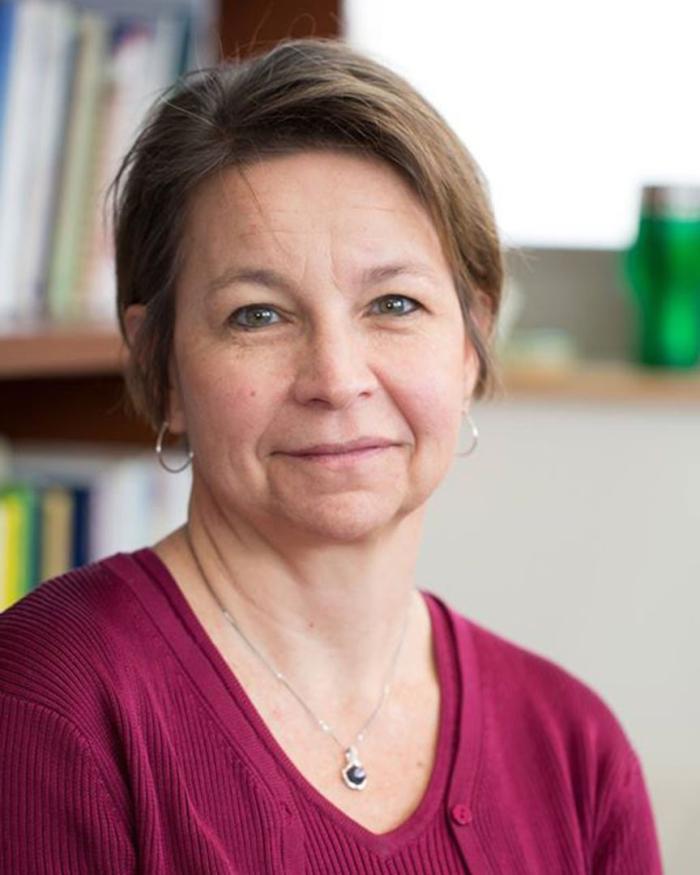Phyllis Ryder

Phyllis Ryder
Executive Director of the University Writing Program; Associate Professor of Writing
Contact:
Through both scholarship and teaching, Phyllis Ryder investigates what it means to write for social change, focusing particularly on what mindsets and material conditions are necessary for truly transformative university-community partnerships. She collaborates with DC nonprofit leaders, former students, and librarians on much of her research. Her 2011 book, Rhetorics for Community Action, offers a theory for conceptualizing public writing in democracy as well as practical guidance for developing first-year writing classes with a service-learning focus. Her work has been published in Rhetoric Review, JAC, Reflections, Community Literacy Journal, among others.
Prof. Ryder also studies how students conceptualize and conduct academic writing and research. Working with UWP faculty colleagues Prof. Hayes and Prof. Friedman, she is conducting a long-term study about how Writing Center training and experience affects undergraduate students' theories of writing.
Prof. Ryder chairs the Local Host Committee for the national 2021 Conference on Community Writing.
Faculty Service Award (Honey W Nashman Center) 2011, 2014, 2015
UW1020: Writing for Social Change, Writing with DC Communities
UW2111W Pedagogy for Peer Tutors
Rhetorics for Community Action: Public Writing and Writing Publics. Lanham, MD: Lexington Books, 2011. Cultural Studies/ Pedagogies/ Activism series. Offering both theoretical analysis and classroom advice, Rhetorics for Community Action is a guide to studying and teaching public writing. The book shows how public groups embed competing democratic ideals into the rhetorical structures of their texts, how they work with and against traditional media to spread those ideals, and how students can practice public writing in all its complexity by partnering with community organizations.
“Democratic Rhetoric in the Era of Neoliberalism“ in Economies of Writing: Revaluations in Rhetoric and Composition. Susan Ryan, Bruce Horner and Brice Nordquist, Eds. Logan, UT: Utah State University Press. (2017): 252-268.
“From Reciprocity to Interdependence: Witnessing Bodies in Service” Community Literacy Journal, 11.1 [special edition on Engaged Infrastructures]. 2016: 94-105.
“Beyond Critique: Global Activism and the Case of Malala Yousafzai" for The New Activism: Composition, Literacy Studies, and Politics Eds. Ben Kuebrich, Steve Parks, and Jessica Pauszek, a Special Issue of Literacy In Composition Studies 3.1 (March 2015): 175-187.
“Preparing ‘Academic Citizens’: Service-Learning in Research Universities” Journal of the Washington Academy of Sciences 97.4 (Winter 2011): 17-32. http://www.washacadsci.org/Journal/Journalarticles/V.97-4-preparing_academic_citizens.pdf
“Public 2.0: Social Networking, Nonprofits, and the Rhetorical Work of Public-Making” Reflections 10.1 (Fall 2010): 29-56.
“The Stranger Question of Audience: Service Learning, Pedagogy, and Public Writing.” Engaging Audience: Writing In an Age of New Literacies. Eds. M. Elizabeth Weiser, Brian M. Fehler, and Angela M. Gonzalez. Urbana, NCTE, 2009: 207-228.
“Rhetorical Publics: Beyond Clarity and Efficiency” Enculturation: A Journal of Rhetoric, Writing, and Culture 6.1 (2008 ) [Electronic Journal] <https://www.enculturation.net/6.1/ryder>
“Writing as a Way of Knowing: Teaching Epistemic Research Across the University.” With Randi Kristensen and Dolsy Smith. Information Literacy and Writing Studies, Vol 2. Grace Veach, Ed. Purdue UP. 2019: 3-16. http://www.thepress.purdue.edu/titles/format/9781557538314
“Emerging scholars: Service-learning, Reflection, and Research” with Bill Gillis, in Service-Learning, Information Literacy, and Libraries. Ed., Jennifer Nutefall. Santa Barbara: Libraries Unlimited Press. 2016.
“Teaching Serendipity,” with Jennifer Nutefall, University Librarian, University of Santa Clara. Accidental Information Discovery, Tammera M. Race, Ed., Elsevier Publishing, 2016: 27–51.
PhD Rhetoric, Composition and the Teaching of English University of Arizona
MFA Poetry University of Arizona
MA Writing Seminars, Johns Hopkins University
BA English and Computer Science, Goucher College

